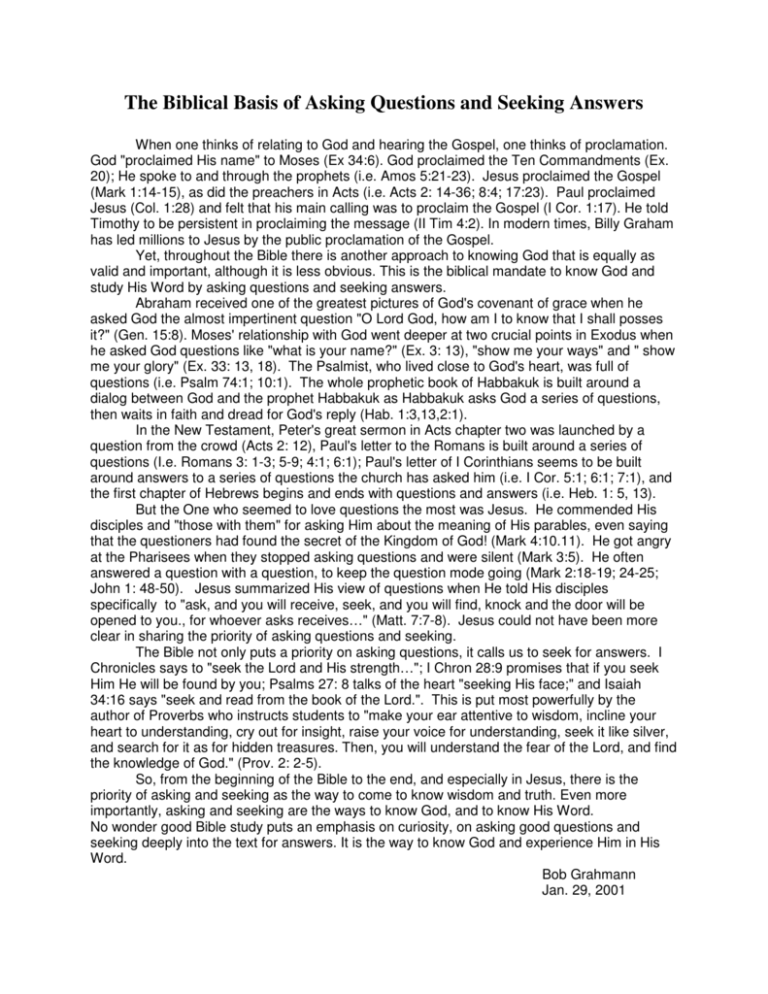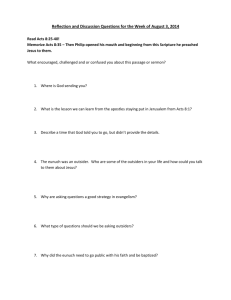The Biblical Basis of Asking Questions and Seeking Answers
advertisement

The Biblical Basis of Asking Questions and Seeking Answers When one thinks of relating to God and hearing the Gospel, one thinks of proclamation. God "proclaimed His name" to Moses (Ex 34:6). God proclaimed the Ten Commandments (Ex. 20); He spoke to and through the prophets (i.e. Amos 5:21-23). Jesus proclaimed the Gospel (Mark 1:14-15), as did the preachers in Acts (i.e. Acts 2: 14-36; 8:4; 17:23). Paul proclaimed Jesus (Col. 1:28) and felt that his main calling was to proclaim the Gospel (I Cor. 1:17). He told Timothy to be persistent in proclaiming the message (II Tim 4:2). In modern times, Billy Graham has led millions to Jesus by the public proclamation of the Gospel. Yet, throughout the Bible there is another approach to knowing God that is equally as valid and important, although it is less obvious. This is the biblical mandate to know God and study His Word by asking questions and seeking answers. Abraham received one of the greatest pictures of God's covenant of grace when he asked God the almost impertinent question "O Lord God, how am I to know that I shall posses it?" (Gen. 15:8). Moses' relationship with God went deeper at two crucial points in Exodus when he asked God questions like "what is your name?" (Ex. 3: 13), "show me your ways" and " show me your glory" (Ex. 33: 13, 18). The Psalmist, who lived close to God's heart, was full of questions (i.e. Psalm 74:1; 10:1). The whole prophetic book of Habbakuk is built around a dialog between God and the prophet Habbakuk as Habbakuk asks God a series of questions, then waits in faith and dread for God's reply (Hab. 1:3,13,2:1). In the New Testament, Peter's great sermon in Acts chapter two was launched by a question from the crowd (Acts 2: 12), Paul's letter to the Romans is built around a series of questions (I.e. Romans 3: 1-3; 5-9; 4:1; 6:1); Paul's letter of I Corinthians seems to be built around answers to a series of questions the church has asked him (i.e. I Cor. 5:1; 6:1; 7:1), and the first chapter of Hebrews begins and ends with questions and answers (i.e. Heb. 1: 5, 13). But the One who seemed to love questions the most was Jesus. He commended His disciples and "those with them" for asking Him about the meaning of His parables, even saying that the questioners had found the secret of the Kingdom of God! (Mark 4:10.11). He got angry at the Pharisees when they stopped asking questions and were silent (Mark 3:5). He often answered a question with a question, to keep the question mode going (Mark 2:18-19; 24-25; John 1: 48-50). Jesus summarized His view of questions when He told His disciples specifically to "ask, and you will receive, seek, and you will find, knock and the door will be opened to you., for whoever asks receives…" (Matt. 7:7-8). Jesus could not have been more clear in sharing the priority of asking questions and seeking. The Bible not only puts a priority on asking questions, it calls us to seek for answers. I Chronicles says to "seek the Lord and His strength…"; I Chron 28:9 promises that if you seek Him He will be found by you; Psalms 27: 8 talks of the heart "seeking His face;" and Isaiah 34:16 says "seek and read from the book of the Lord.". This is put most powerfully by the author of Proverbs who instructs students to "make your ear attentive to wisdom, incline your heart to understanding, cry out for insight, raise your voice for understanding, seek it like silver, and search for it as for hidden treasures. Then, you will understand the fear of the Lord, and find the knowledge of God." (Prov. 2: 2-5). So, from the beginning of the Bible to the end, and especially in Jesus, there is the priority of asking and seeking as the way to come to know wisdom and truth. Even more importantly, asking and seeking are the ways to know God, and to know His Word. No wonder good Bible study puts an emphasis on curiosity, on asking good questions and seeking deeply into the text for answers. It is the way to know God and experience Him in His Word. Bob Grahmann Jan. 29, 2001









